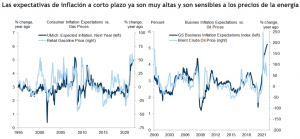
Prior to the crisis, investors' focus was on inflation dynamics in the face of slowing economic growth and concerns about monetary normalization.
From a global macroeconomic point of view, the geopolitical crisis mainly affects markets as a supply-side shock. It suggests that supply-side bottlenecks, which had been a major challenge since the Covid-19 pandemic, may persist further, with negative outcomes and repercussions on growth prospects. The most significant and immediate impact will be on energy prices due to the heavy dependence on Russian gas supplies. For this reason, along with the possible supply side effects of potential additional sanctions against Russia, the inflationary backdrop is expected to worsen in the near term. Inflation has become a major political challenge in many countries, and several governments are likely to consider implementing measures to alleviate the impact on their citizens.
In this context, it is understandable that the announcements of new U.S. sanctions against Russia, beyond being described as "crushing" by President Biden, specifically exempted Russian oil and gas sales and exports of several other raw materials.
Biden himself added that he would do everything possible to protect U.S. consumers from any adverse effects, which is tantamount to admitting that nothing would be done that could threaten Russia's ability and willingness to continue supplying world energy markets. Officially, the U.S. and European governments have been saying that they might consider another round of "even tougher" sanctions. However, it is becoming difficult to imagine what additional actions would be necessary on Russia's part to provoke this "even tougher" response.
At the time of writing, markets are trading more stable and sentiment has been boosted after Russia said the neutrality offer made by Ukraine is a "positive development" and following reports that China's President Xi held a phone call with Putin, who said Russia is willing to conduct high-level negotiations with Ukraine.
Beyond a possible "relief rally" in assets if geopolitical tensions ease at the margin, we believe the potential for recovery will remain limited, because if not geopolitics, it will be inflation concerns and monetary policy normalization and a possible "policy error" that will dominate the scene.
There is "a temptation" to conclude that rising geopolitical tensions will "deter" Central Banks and, in particular, the Federal Reserve from backtracking on their intentions for a faster normalization process.
It makes sense in principle. History shows that the combination of upside inflation risk and downside growth risk has mixed implications for monetary policy. Historically, Fed officials have sometimes preferred to delay major policy decisions until uncertainty around geopolitical risks diminishes. In some cases, such as after 9/11 or during the U.S.-China trade war, the FOMC has cut the funds rate.
But, the current situation is different from past episodes,when geopolitical events led the Fed to delay tightening or ease, because inflation risk has created a stronger and more urgent reason for the Fed to tighten today than in past episodes . With near-term inflation expectations already high, additional increases in commodity prices could be more worrisome than usual. As a result, geopolitical risk is not expected to prevent the FOMC from steadily raising 25 bps at its upcoming meetings, although it is reasonable to expect geopolitical uncertainty to further reduce the odds of a 50 bps hike in March.
According to Goldman Sachs estimates, a US$10/bbl increase in oil prices boosts US core PCE inflation by 3.5 bps and headline PCE inflation by 20 bps, but reduces GDP growth by just under 0.1 bps. The blow to growth could be somewhat larger if geopolitical risk substantially tightens financial conditions and increases uncertainty for businesses.

So, geopolitical tensions do matter, but the underlying problem facing markets and therefore investment decisions today is inflation (risk fed back by geopolitics, by the way) and it must be addressed decisively and dare I say more... it is preferable for the Fed to be firm in March than to remain accommodative, contrary to common sense it may be far better received by the market, as there is nothing more damaging to business and consumer decisions than uncertainty around inflation.
Any recommendations?
Add commodity exposure. The geopolitical escalation has greatly increased the risk of further aggravating the energy and commodities crisis that developed over the past 2 years. Potential disruptions to trade in oil, gas, grains and metals now represent a significant risk to investments and the real economy. Investors should therefore hedge this risk by increasing allocations to commodities, energy and materials. These allocations would serve as a hedge for inflation, geopolitical risks.
Humberto Mora
Strategy and Investments